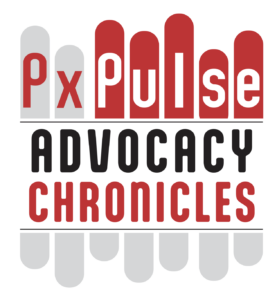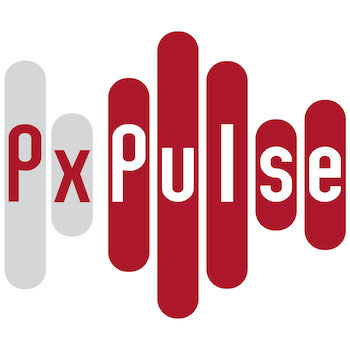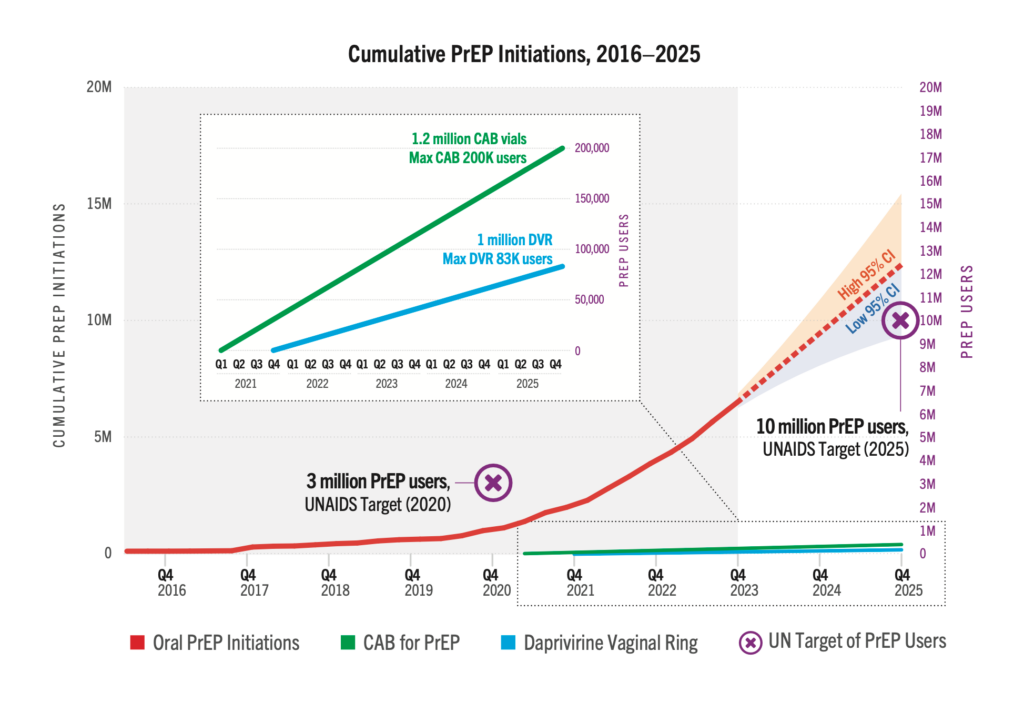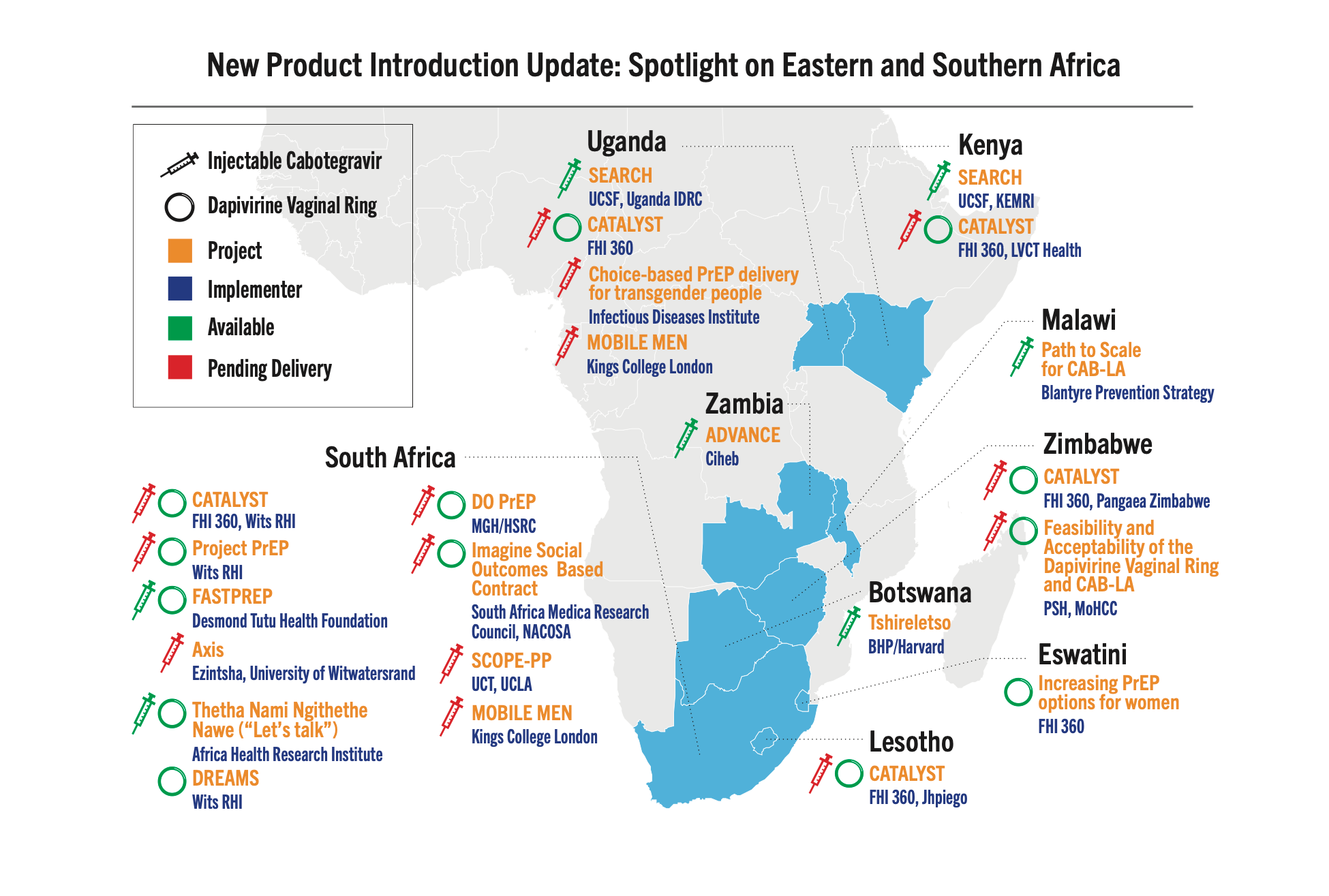This infographic provides a comprehensive overview of HIV vaccine and antibody efficacy trials. Over 20 years and 12 trials, only two positive signals have been observed.
HIV Vaccine and Antibody Efficacy Trials to Date
PxPulse: The Advocacy Chronicles with APHA’s Yvette Raphael

Our debut episode of the Advocacy Chronicles features Yvette Raphael, the Executive Director of Advocacy for Prevention of HIV and AIDS (APHA) in South Africa, and a leader in the development of The Choice Manifesto, supported from start to finish by CASPR.
As co-chair of the African Women Prevention Community Accountability Board (AWPCAB), Yvette and other board members launched the manifesto in Kampala, in September 2023, calling for choice in HIV prevention options for women — such as oral and injectable cabotegravir for PrEP, the dapivirine vaginal ring and the Dual Prevention Pill — and a commitment to expanding access to them. A call heard by UNAIDS Executive Director Winnie Byanyima, who was on hand at the launch to endorse the manifesto.
Yvette, who is also a 2014 AVAC Advocacy Fellow and celebrated as one of South Africa’s leading human rights activists, lays out why The Choice Manifesto matters and how advocates are leveraging it.
Resources
- The Choice Manifesto, AWPCAB
- Reclaiming Choice: The launch of the HIV Prevention Choice Manifesto and what that means, AVAC Blog
- HIV Prevention Choice Manifesto for Women and Girls in Africa launched, UNAIDS
- Stakeholder Commitments to the Choice Manifesto
- Learn more about APHA
- Learn more about CASPR
For Us by Us: PrEP in Black America – A Master Plan for HIV Prevention in Black America
In the spirit of seeking change to ameliorate the devastating impact of HIV in Black communities through biomedical HIV prevention, Black leaders convened the “PrEP in Black America (PIBA) Summit” virtually and in person on September 13, 2022, in Atlanta, Georgia. Attendees have included Black activists, researchers, scientists, providers, and policymakers from across the country representing more than 50 organizations. Following the event, PIBA generated a report summarizing the event and key recommendations entitled, “For Us by Us: PrEP in Black America – A Master Plan for HIV Prevention in Black America.”
Read the full report, “For Us by Us: PrEP in Black America – A Master Plan for HIV Prevention in Black America” here.
The More We Know
Science and real-world experience continue to demand a re-assessment of our collective understanding of the safety and effectiveness of PrEP options for women, including oral, vaginal ring, and injectable options. For instance, a new paper in the Journal of the American Medical Association by Dr. Jeanne Marrazzo (HIV Pre-Exposure Prophylaxis with Emtricitabine and Tenofovir Disoproxil Fumarate Among Cisgender Women) challenges the notion, baked into policies, programs and “conventional wisdom”, that cisgender women need to be “super-adherers” to achieve protection utilizing oral PrEP. In this webinar, we discussed this important paper and more.
Speakers:
• Dr. Jeanne Marrazzo, National Institute of Allergy and Infectious Diseases
• Joyce Ng’ang’a, WACI Health
Moderator:
Raniyah Copeland, Equity & Impact Solutions
Materials:
Recording / Ukrainian Audio / Slides / Resources / Audio Transcript (English/Ukrainian)
Announcing the 2024/25 AVAC Advocacy Fellows
We are pleased to announce our 13th class of the flagship AVAC Advocacy Fellows Program for 2024-2025! This group of seven advocates will participate in an 18-month program that supports their advocacy efforts, invests in the further development of their skills, shapes the agenda for HIV prevention research, and influences how quickly new interventions move into policy and programs in their communities and countries.
Developments in the HIV Biomedical Prevention Pipeline & PrEP Implementation Issues
The European AIDS Treatment Group published a report covering two online discussions on the HIV biomedical prevention research & PrEP implementation issues for community educators and advocates. The report covers developments from the PREVENIR Cohort study, on long-Acting intramuscular PrEP, DoxyPEP, vaccine, as well as STI-PEP research. It also reviews challenges in the uptake of PrEP among women and in particular migrant women from sub-Saharan Africa and trans people.
Download the report. For more information and to see the recordings of the online discussions, click here.
Decolonizing Global Health: Dr. Madhukar Pai and COMPASS Africa Tell Us Why and How
Produced and hosted by Jeanne Baron.

Investing in the long-term success of African leadership is essential to breaking cycles that perpetuate inequity and that stall progress in the HIV response. In January, The Coalition to build Momentum, Power, Activism, Strategy and Solidarity (COMPASS Africa) announced a major transition, with Pangaea Zimbabwe assuming the role of secretariat and the launch of a decentralized approach to governance across the coalition. These changes come as other efforts, such as negotiations on the Pandemic Accord, are struggling to advance, uphold or safeguard equity.
In this episode of PxPulse, we talk about why and how the decisions that shape global health must be made by those facing the greatest risks. As the world evaluates the pandemic response and debates on decolonizing global health gain momentum, equity in global health has never been more urgent.
This conversation features global health leader and critic, Dr. Madhukar Pai. And two members of the transnational coalition COMPASS Africa, Francis Luwole and Barbra Ncube, offer an up-close look at the coalition’s pioneering new model for power-sharing.
Tune in to Hear
- Dr. Pai, a Canada Research Chair in Epidemiology & Global Health at McGill University, Co-Editor-in-Chief of PLOS Global Health, and a frequent contributor in the media on equity in global health
- Francis Luwole, the Tanzania Country Coordinator for COMPASS Africa
- Barbra Ncube, Programs Quality Coordinator for Pangaea Zimbabwe and member of COMPASS Africa
Links
Advocacy Resources
- Towards Authentic Institutional Allyship by Global Health Funders, PLoS Global Public Health
- Will Global Health Survive its Decolonisation?, Lancet
- Addressing Power Asymmetries in Global Health: Imperatives in the wake of the COVID-19 pandemic, PLoS Medicine
- New COMPASS Governance Structure to Accelerate HIV Policy and Advocacy, AVAC
- The Way Forward in Decolonising Global Health, Lancet
- The Pandemic Treaty: Shameful and unjust, Lancet
- PLOS Global Public Health
- Decolonizing Global Public Health: Exploring the how, from now til as long as it takes,The Choice Agenda
Unpacking Cure at CROI: A Q&A with Jessica Salzwedel
This year’s Conference on Retroviruses and Opportunistic Infections (CROI) in Denver, Colorado, was the setting for important updates on the HIV reservoir lending to new insights into potential cure strategies. AVAC’s Senior Program Manager for Research Engagement, Jessica Salzwedel, leads AVAC’s advocacy for HIV cure research and serves as the community engagement coordinator for three of ten NIH-funded international collaboratories: the Research Enterprise to Advance a Cure for HIV (REACH), Immunotherapy for Cure (I4C), and Pediatric Adolescent Virus Elimination (PAVE). These are aimed at developing therapeutic interventions to cure HIV infection. Jessica shares her highlights from the research and what it means for advocacy.
There was so much on HIV cure presented at CROI. What stood out to you as most important for advocates to follow?
I was really excited to see advances in both basic science and clinical research. Four results in preclinical and clinical research stood out because they advanced how researchers might tailor cure strategies to optimize the impact for people with HIV. We heard more about the potential role of sex hormones in directing the immune system in a study looking at fetus acquisition of HIV by Gabriela Cromhout. Another study by Toong Seng Tan of the Ragon Institute showed that women may be better candidates for the so-called “block and lock” strategy. We also heard results from IMPAACT P1115 trial by Deborah Persaud, which showed that early HIV treatment can lead to control of the virus in children. Finally Maurico Martin’s nonhuman primate study of adeno-associated virus, which delivered broadly neutralizing antibodies (bNAbs) and may offer a pathway to a scalable, durable control option for pediatric cure. In basic science, Katherine Bar presented data that suggests researchers, and by default advocates, should be looking at autologous neutralizing antibodies in some people to delay rebound. And finally, I’m excited about early-career investigator Louise Leyre’s research out of Weill-Cornell, which is looking at rare T-cells that seem to resist killing, which could be important in developing strategies that could lead to durable control and eradication of HIV.
Can you break down the research on sex hormones? Will biological sex play a role in cure strategies?
We’ve got more evidence now that biological sex plays a role. Cromhout showed differences in HIV acquisition between male and female fetuses in utero, building off data she presented at IAS 2023. This data analyzes the virus from a cohort of 281 mother-infant pairs. Her team found that male fetuses tend to acquire a “high fitness” virus sensitive to IFN-1, a first-line immune defense, while female fetuses acquire a “low fitness” virus resistant to IFN-1. Viral fitness refers to the ability of the virus to replicate. Cromhout showed that the acquisition of HIV in utero is driven by the immune system of the fetus and not differences in the virus of the mothers. Understanding the host-virus relationship, and how the immune system puts pressure on the virus to change in the early stages of infection is important for directing future cure strategies.
In the study of people with HIV who have long-term suppression via ART, presented by Toong Seng Tan from the Ragon Institute, biological sex is a factor in determining reservoir composition over time. Tan looked at intact versus defective proviruses (the pieces of HIV that have integrated into DNA) as well as where HIV had integrated into a person’s DNA. He did not find any significant difference between the amount of intact virus (which can cause harm) and defective virus between men and women. But women had a higher portion of HIV integrated into areas of their DNA that were “transcriptionally silent”, meaning HIV could not rebound, after long-term suppression on ART. The women in the study were all post-menopausal at the time of enrollment, so more work is needed to understand how hormones shape reservoir characteristics in women, both cis and trans, at younger ages. The results suggest that women may be better candidates for a cure strategy under investigation known as “block and lock”. The strategy is trying to drive HIV deeper into latency so it cannot rebound.
We’re seeing more results on children’s ability to control HIV off treatment, how significant is this?
This is significant, but we know early treatment is not for everyone. Deborah Persaud of Johns Hopkins University presented the results of IMPAACT P1115, which enrolled 54 infants who acquired HIV in utero and received combination therapy within 48 hours of birth. Six children met the criteria for an analytic treatment interruption (ATI). These criteria were sustained viral suppression from 48 weeks onward, normal CD4 count, negative HIV serostatus using a highly sensitive assay, and no detectable virus. Of the six children who underwent an ATI, four achieved durable control, defined by the study as remaining undetectable over 44 weeks. One of the four controllers rebounded at 80 weeks while the other three remain on an ATI. Two of the six children who met the criteria for ATI rebounded at eight and ten weeks respectively. The study confirms that early treatment can lead to control of the virus in some children; however, it is not a strategy for all. Even with the vastly reduced reservoir size caused by almost immediate treatment, the virus is not completely eradicated and may rebound in some children off therapy.
Another study, this one in nonhuman primates, presented by Maurico Martins of the University of Florida, showed promising progress toward a 4-dose single injection regimen that led to durable control in all animals treated with the investigational product. This study evaluated the adeno-associated virus (AAV) vector delivering antibodies. AAV is a unique platform because it has been shown to last for the duration of the cell. This study is targeting muscle cells, some of the longest-lived cells in the body, to deliver the AAV vector. The next step is to move this strategy into human clinical trials. This approach could offer a durable, scalable and cost-effective way to control or cure pediatric HIV.
For advocates new to cure, why is the reservoir important and what can you tell us about these rare T-cells and their role?
The “reservoir” is the collection of cells that have HIV integrated into the DNA but are not replicating. They are important because once cell replication begins, so does virus production. In the absence of ART, this is the cause of rebound. At CROI, we saw several advances in basic understanding, targeting and reactivating the reservoir. Early-career investigator Louise Leyre of Weill-Cornell presented research on a potential mechanism for why a small subset of HIV-infected T-cells resist being killed by natural killer cells. These rare HIV-infected T-cells are “slippery and squishy” and avoid being killed due to weak adhesion proteins on the cell surface. This prevents the killer cell from attaching properly. This is important for cure research because a small subset of cells can lead to viral rebound off therapy. Identifying why some cells resist killing is important to develop strategies that can lead to durable control and eradication of HIV.
Lastly, I wanted to highlight Katherine Bar’s presentation on the potential of autologous neutralizing antibodies. Autologous neutralizing antibodies are the antibodies the body makes against the virus. In natural infection the virus is always one step ahead. When treatment is started, virus evolution pauses. To see what role autologous antibodies play, Bar tested the sensitivity of the reservoir and rebound virus of trial participants in the BEAT-2 trial, which evaluated the impact of a combination of bNAbs (3BNC117 and 10-1074) and type 1 interferon (IFN-1) with an ATI against the autologous antibodies. When a researcher says “testing sensitivity” they are looking at whether a virus is neutralized by an antibody or not. Bar and her team found that the two participants who experienced delayed rebound in the trial had reservoir virus sensitive, meaning it could be neutralized, by autologous antibodies. This may have delayed rebound after the broadly neutralizing antibodies waned from their system. It is important for cure research because autologous antibodies may be another approach to increase the duration of control off therapy. Researchers may look at approaches to enhance these antibodies before a treatment interruption in future combination approaches.
So, what are our key points for advocacy coming out of CROI?
- Diversity matters. It is critical clinical research includes participants from all geographic locations, age, and sex.
- Cure will not bring a one-size-fits-all strategy, and it is important to learn the combination strategies currently being pursued in clinical research as well as the future strategies that basic science discovery is generating.
- There are still basic questions that need to be answered for researchers to find a safe, scalable, durable and affordable cure. Advocates should follow the science and encourage funders to continue to invest, build community and research infrastructures to translate knowledge, and prepare for future clinical research.
Cumulative PrEP Initiations
In 2020, the world missed the UNAIDS’ goal of reaching 3 million PrEP users. The updated target for 2025 is 10 million. Is the 2025 target achievable based on the current trends in PrEP uptake? Excerpted from an issue of PxWire.
PxWire Volume 14, Issue No. 1
PxWire is AVAC’s quarterly update covering the latest in the field of biomedical HIV prevention research and development, implementation and advocacy. Each issue includes updates, emerging issues and upcoming events. A PDF version of this report is also available.
Progress in PrEP Uptake
In 2020, the world missed the UNAIDS’ goal of reaching 3 million PrEP users. The updated target for 2025 is 10 million. Is the 2025 target achievable based on the current trends in PrEP uptake? Applying an Autoregressive Integrated Moving Averages (ARIMA) model to data from the Global PrEP Tracker since Q3 2016, we forecasted cumulative PrEP initiations through 2025. Based on this model, the world will surpass 10 million global cumulative PrEP initiations by Q1 2025, and by Q4 it will reach 12.4 million. This data reflects oral PrEP initiations, not continued use.

- PrEP users and PrEP initiations are different. Data on initiations do not distinguish between new versus repeat PrEP users. We are unable to predict if the UNAIDS goal of achieving 10 million PrEP users by 2025 will be successful. This forecast shows the possibility and the promise of current momentum. But fulfilling this promise is not certain. It depends on overcoming key challenges around access and choice.
- These updates from AVAC’s Global PrEP Tracker analyze trends and showcase data reflecting Q4 2023 updates.
Global Milestones from October-December 2023
- The PrEP Tracker documented 6,220,507 cumulative initiations of some form of PrEP worldwide: 6,216,310 oral PrEP (including TDF/FTC, event-driven oral PrEP, and F/TAF), 2,695 injectable cabotegravir (injectable CAB), and 1,502 dapivirine vaginal ring (DVR).
- Global PrEP uptake increased by about 500,000 PrEP initiations this quarter, modestly slower than in the last two quarters. Last year at this time, global PrEP initiations stood at 3.8 million, so this year’s increase demonstrates relatively high uptake compared to the previous year.
Country-level Milestones
- South Africa surpassed 1.3 million oral PrEP initiations; Zimbabwe surpassed 250,000 initiations. In less than a year, Malawi more than doubled its oral PrEP initiations and now stands at over 100,000. Rwanda surpassed 30,000, Cote d’Ivoire surpassed 20,000, and Sierra Leone surpassed 10,000 initiations.
- Other countries outside of Africa had modest increases in oral PrEP uptake: Brazil counted over 150,000 initiations; the Philippines surpassed 20,000 initiations.
PrEParing for New Products
Product Updates
- In February, Zambia launched its injectable CAB program, making it the first country outside the US to include injectable CAB in its HIV prevention services. And the Desmond Tutu Health Foundation in South Africa also announced “the first jab” of injectable CAB administered in its FASTPrEP study. As these programs get underway, more country approvals and product launches are anticipated.
- This quarter, Namibia approved the dapivirine vaginal ring (DVR), bringing the total to 11 approvals in the region.
- Uruguay approved F/TAF (Descovy). Additionally, Descovy is under review in Mexico.
- Peru, Nigeria, Thailand, and Uganda have approved injectable CAB.
- Injectable CAB is under review in the United Kingdom, Cote d’Ivoire, Mozambique, Rwanda, Tanzania, and Canada. CAB was granted WHO prequalification status, finding it to be safe, effective, and supported by studies.
- PrEPWatch added 35 new country pages detailing the status of drug registration for PrEP products, data on PrEP initiation by product, country-level PEPFAR targets, and links to key policy documents and guidelines.
- At ICASA, the Population Council presented preliminary results from a dual prevention pill (DPP) acceptability study with adolescent girls and young women (AGYW) in Zimbabwe. The study found 2/3 of participants preferred a proxy for the DPP (which combines contraceptives and PrEP) compared to 1/3 who preferred taking oral PrEP and oral contraceptive pills separately. Results from another DPP acceptability study in South Africa are forthcoming and the HPTN 104 study is expected to kick off later this year, expanding the evidence on end-user experiences.
- Alongside oral PrEP, introduction of the dapivirine vaginal ring (DVR) and injectable cabotegravir (CAB) will play a role in the scale of PrEP uptake. At least 1.2 million vials of CAB are now available for procurement and prevention programming in low-and middle-income countries over the next two years. At the same time, one million vaginal rings are projected to be distributed over the next two years. But even with these additional options, oral PrEP will continue to play a big role in PrEP uptake in the short term.
- For a full global perspective on product introduction, check out the Integrated Study Tracker and Country Planning Matrix and see our graphic on the status of implementation scient studies on the next page.

The Latest R&D in the Prevention Pipeline
In 20 years of research and across 12 trials, only two positive signals have been observed in HIV vaccine and antibody studies.

- In December 2023, the PrEPVacc team announced no efficacy from the vaccine candidates in the study. This was folowing a review by the independent data monitoring committee. PrEP interventions in the study, comparing TAF/FTC (Descovy) to TDF/FTC (Truvada) will continue. The termination of vaccine arms of the PrEPVacc study represents the most recent HIV vaccine or antibody trial to end without efficacy.
- Ensuring equitable access to safe, effective, and affordable vaccines involves advocacy across multiple areas. AVAC covers the issues in a series of advocates’ guides, From the Lab to the Jab.
Prevention Playlist
AVAC develops a wide range of materials and resources to inform decision making and action. Check out the latest:
Join
CROI 2024 Community Breakfast Club Webinars
- Session 1: Spotlight on Social and Behavioral Sciences at CROI 2024
- Session 2: Living with HIV for a Lifetime— It’s Complicated
- Session 3: Research Roundup: Scientists and Advocates Offer Fresh Perspectives and Seasoned Analyses of CROI 2024 Research
Read
- Long-lasting HIV jab marks ‘new era for prevention’ in Africa, The Telegraph.
- GPP Body of Evidence, demonstrating the power of GPP
- Global HIV Prevention Roadmap for Key Populations
- Mobilizing People of Faith to Overcome Homophobia
- What can modelling tell us about the scale-up of CAB for PrEP?
- New licensing agreement set to double HIV vaginal ring supply in Africa
Watch and Listen
- HIV Cure and the Environment: How location informs cure research
- AVAC in Conversation with NIAID’s Jeanne Marrazzo
- PrEPVacc: An in-depth look at the trial and what’s next
- Cervical cancer awareness month webinar series
- Reporting the African Science Story: Decoding scientific research to support public health in Africa
- Sex, Gender & HIV Cure Research
- The Adolescent Medicine Trials Network (ATN): Research addressing HIV health inequities among US adolescents and young adults
Use
- From the Lab to the Jab, a series of advocates’ guides to advance access to safe, effective and affordable vaccines
- The HIV Prevention Ambassador Training Package and Toolkit prepares potential and current PrEP users to be leaders—or “Ambassadors”—in the rollout of PrEP
- HIV Prevention User Journey Tool supports providers and adolescent girls and young women to explore what prevention method fits best in their lives
- PrEP for Pregnant and Lactating People-Clinical Guidelines and Training Package
- Communicating the PrEP Category to Adolescent Girls and Young Women—a strategy brief to support demand generation for PrEP among AGYW
- Online Course: Unlocking the Potential of Implementation Science and Good Partcipatory Practices
